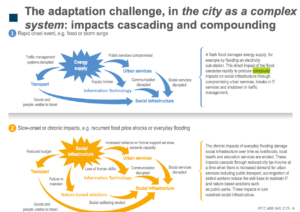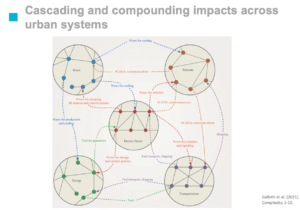Simulating Cascading Climate Impacts in Coastal Cities

Figure 1: The figure above, commenting materials from the Intergovernmental Panel on Climate Change reflects some known mechanisms of relevance on the topic (see larger version at https://www.ipcc.ch/report/ar6/wg2/figures/chapter-6/figure-6-002).

Figure 2: Some known mechanisms potentially leading to cascading effects across urban systems (see larger version at https://onlinelibrary.wiley.com/doi/10.1155/2021/1782354).
Compound and cascading events exist in cities and have been included in the last IPCC report as a growing issue. They are a complex issue that has not been well addressed quantitatively, in part because of the multiple interactions across urban systems, the uncertainties about their failure in case of extreme event, and the lack of data about how cascading mechanisms could be catastrophically triggered across urban systems.
Sea-level rise poses a significant threat to coastal cities worldwide, leading to a cascade of climate impacts that extend beyond immediate flooding and erosion. This research aims to explore the multifaceted consequences of sea-level rise on urban coastal environments, focusing on the interconnected social, economic, and ecological systems. Coastal cities, often densely populated and economically vital, are particularly vulnerable to these changes, which can exacerbate existing challenges such as infrastructure degradation, habitat loss, and socio-economic disparities.
This study will employ a multidisciplinary approach, integrating climate science, urban planning, and socio-economic analysis to assess the direct and indirect impacts of sea-level rise. Cascading and compounding risks and uncertainties need to be explored in the context of extreme hydro-meteorological events fueled by climate change and potentially triggering catastrophic cascading failures of urban systems. An expert elicitation approach to inform a simulation tool capturing all the risks and uncertainties could serve to fill this gap and produce probabilistic approaches, that could be modelled for a generic urban system, and later applied to a specific urban context.
Coastal cities, their risks under high-end climate scenarios and the transformations needed to respond to them, are perhaps the most extreme case. Exploring all the response actions across all urban systems poses another puzzle, that could be solved combining the above-mentioned probabilistic simulation tool (essentially and agent-based model) with an Artificial Intelligence Large Language Model devising strategies to decrease the maximum risk with the minimum cost, and combining these strategies in new “cascade-safe urban resilience pathways”. Response options could include out-of-the-box thinking like floating settlements, amphibious cities, and protection walls paid for by houses built on them.
Additional information.
Assessment Report 6, Working Group II, Chapter 6: https://www.ipcc.ch/report/ar6/wg2/chapter/chapter-6/#6.2.5
Dr. Roger Cremades, School of Earth and Environment, Sustainability Research Institute, (https://environment.leeds.ac.uk/see/staff/13034/roger-cremades).
Dr. David Dawson, School of Earth and Environment, Sustainability Research Institute, (https://environment.leeds.ac.uk/staff/1843/david-dawson).
